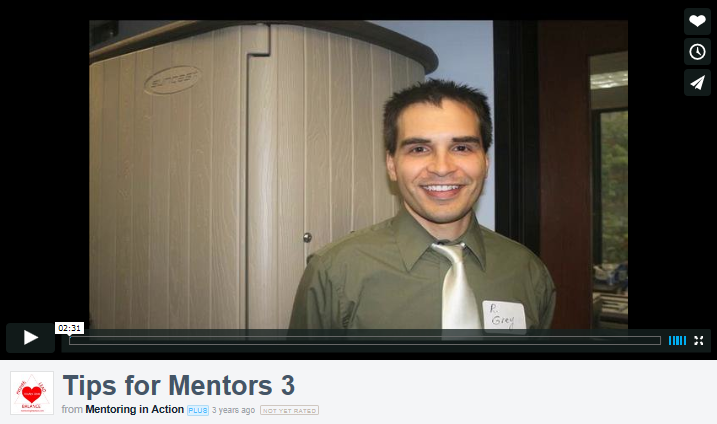Qualified mentors require mentor skills. Using Mentoring in Action: A Month by Month Curriculum to organize your qualified mentor- training program will provide your mentors with a tool that coaches the mentor through the entire school year. Watch Mentor Testimonials for Mentoring in Action to hear how other mentors have used the book effectively. Use the free e-book to guide you through the book to get the most out of this practical tool. Click here to download the e-book.
The other videos in this category are organized into three groups:
1) Tips for Mentors (1, 2, and 3)
2) Conversations with novice teachers: which include Quality Conversations and the Using Collaborative Log
3) Observing a novice teachers
Consider using any of these videos in your mentor-training program to ensure your mentors are prepared and qualified to meet the challenges of talking with novice teaches.
 | Mentoring in Action Testimonials Mentors from a state-wide mentor training program share the highlights of the Mentoring in Action: A Month by Month Curriculum book and how they used it to be more effective mentors. Prompts: What stood out to many mentors as a key feature of the book? How is the book useful to creating a common language for novice teachers? How can these mentoring conversations align with state educator evaluation standards? Standards Color Coding for First Year Matters  |
 | Observation and Feedback Tools - Part 1 Carol Pelletier Radford Ed.D. interviews a former principal about effective supervision strategies. These practical strategies are valuable to cooperating teachers working with student teachers, university supervisors visiting schools, and mentors working with beginning teachers in their districts. Prompts: What stands out to you as potentially useful? How could you use this information in your context? PDF tool from Lyman |
 | Observation and Feedback Tools - Part 2 Carol Pelletier Radford Ed.D. interviews a former principal about effective supervision strategies. These practical strategies can be used for observing student teachers and novice teachers. Prompts: Which strategies did you find useful to you? Why is it important for supervisors to be consistent and use a protocol for supervising beginners? PDF tool from Lyman |
 | Post Conference Conversations A university supervisor demonstrates post conference questions and feedback with three novice teachers. Questions, specific feedback, and ideas for future lessons are shown. March chapter in the Mentoring in Action book provides details for supervisors and mentors. Prompts: How effective is the use of questions with the novice teachers? How did the supervisor integrate some specific suggestions into the conferences? How did the supervisor use direct feedback with one of the teachers? Why do you think she did that? |
 | Using the Collaborative Log Two mentor leaders discuss the importance of using a protocol with a novice teacher. The importance of aligning the protocol to state standards is highlighted. Prompts: What did you find useful in this video about using a protocol? How does alignment to state standards support novice teacher development? PDF of LOG |
 | Novice Teacher Demonstration Lesson A student teacher offers mentors and novice teachers a glimpse of classroom practice. Prompts: What are Greg’s strengths? How could he improve? How would you share your recommendations with him? How could you use this video to prepare mentors to provide feedback to a novice teacher? PDF of Greg process for Trainers  |
 | Tips for Mentors 1 This audio with photos features five novice teachers reflecting on what was most meaningful from their mentors. Prompts: Which of these five ideas related to you? Why is it important to capture novice teachers’ ideas after their student teaching or first years of teaching? How can the ideas improve mentor training? |
 | Tips for Mentors 2 This audio with photos features five novice teachers reflecting on what was most meaningful from their mentors. Prompts: Which of these five ideas related to you? Why is it important to capture novice teachers’ ideas after their student teaching or first years of teaching? How can their ideas improve mentor training? |
 | Tips for Mentors 3 This audio with photos features five novice teachers reflecting on what was most meaningful from their mentors. Prompts: Which of these five ideas related to you? Why is it important to capture novice teachers’ ideas after their student teaching or first years of teaching? How can these ideas be integrated into mentor training programs? |



